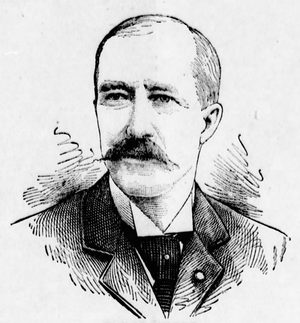Philip Knopf facts for kids
Quick facts for kids
Philip Knopf
|
|
|---|---|
 |
|
| Member of the U.S. House of Representatives from Illinois's 7th district |
|
| In office March 4, 1903 – March 3, 1909 |
|
| Preceded by | George Edmund Foss |
| Succeeded by | Frederick Lundin |
| Member of the Illinois Senate | |
| In office 1886-1894 |
|
| Personal details | |
| Born | November 18, 1847 Long Grove, Illinois |
| Died | August 14, 1920 (aged 72) Chicago, Illinois |
| Political party | Republican |
Philip Knopf (born November 18, 1847, died August 14, 1920) was an important politician from Illinois. He served as a U.S. Representative, which means he helped make laws for the country.
Contents
Philip Knopf's Early Life and Career
Philip Knopf was born on November 18, 1847, near Long Grove, Illinois. He went to public schools when he was young. During the American Civil War, he joined the army. He was part of the 147th Illinois Volunteer Infantry Regiment. He served until his group was finished with their duty in Savannah, Georgia.
After the war, in 1866, he moved to Chicago. He studied at Bryant and Stratton's College for one year. For many years, he worked in the "teaming business," which involved using horses and wagons for transport.
In 1884, Philip Knopf started working in public service. He became the chief deputy coroner and held that job for eight years. From 1886 to 1894, he was a member of the Illinois Senate, helping to make laws for the state.
Serving Cook County
From 1894 to 1902, Philip Knopf served as the clerk of Cook County. This is a big job that involves keeping official records for the county.
He was also active in the Republican Party. In 1896, he was chosen as a delegate for the 1896 Republican National Convention. This is a meeting where the party chooses its candidate for president. He was also part of the State Republican central committee.
Time in Congress
Philip Knopf was elected to the United States House of Representatives. He served three terms as a Republican. His time in Congress lasted from March 4, 1903, to March 3, 1909.
During his time in Congress, he led an important group. He was the chairman of the Committee on Expenditures in the Department of the Treasury. This committee looked at how the government's money was being spent in the Treasury Department.
Later Life and Legacy
Philip Knopf passed away in Chicago, Illinois, on August 14, 1920. He was buried in Rosehill Cemetery.
 | Emma Amos |
 | Edward Mitchell Bannister |
 | Larry D. Alexander |
 | Ernie Barnes |

